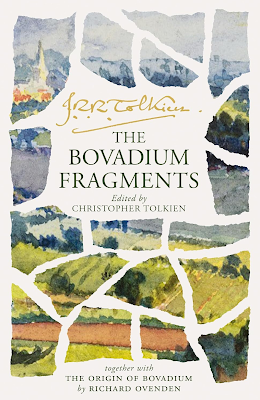New Tolkien Book Announced: THE BOVADIUM FRAGMENTS
A new Tolkien book has been announced for publication in the fall: The Bovadium Fragments. It's certainly one that I haven't heard of before, and as such, was not expecting.
Off the bat, it is not Middle-earth related. I know there's some readers that only care for the Middle-earth material, so I wanted to make that distinction. It would fit more in line with material such as Mr. Bliss and Tales From the Perilous Realm.
It has been announced as both hardback and eBook, from both publishers. As such, ISBNs won't be needed, as finding it should be simple enough at this stage. I'm undecided as to which format I'd want: hardback (I understand the appeal of a new Tolkien book in hardback, though I'm looking forward to unboxing/'look inside' type videos), eBook (to have and read, without taking up physical space) or to wait for the paperback edition. As time draws near and I see more of the book....I'll reach a decision. But I will get it!
To find more out about the book (background info etc) head here: https://tolkiengateway.net/wiki/The_End_of_Bovadium#:~:text=The%20End%20of%20Bovadium%20(author's,written%20in%20the%20early%201960s.
Here's the official description:
World first publication of a previously unknown short satirical fantasy by J.R.R. Tolkien, edited by his son, Christopher Tolkien, and accompanied by illustrations from the author together with an essay, The Origin of Bovadium, by Richard Ovenden OBE.
As Christopher Tolkien notes in his Introduction, The Bovadium Fragments was a ‘satirical fantasy’ written by his father, which grew out of a planning controversy that erupted in Oxford in the late 1940s, when J.R.R. Tolkien was the Merton Professor of English Language and Literature.
Written initially for his own amusement, Tolkien’s tale was a private academic jest that poked gentle fun at such things as 'the pomposities of archaeologists' and 'the hideousness of college crockery'. However, it was at the same time expressing a barbed cri de coeur against the inexorable rise of motor transport and 'machine-worship' that was overwhelming the tranquillity of his beloved city.
Enriched by a selection of illustrations by the author, and enhanced by Christopher Tolkien's notes and commentary, readers can enjoy at last this tale of an imagined Oxford viewed through the lens of future (and not wholly reliable) academic study.
Richard Ovenden's accompanying essay paints a vivid portrait of Oxford during that time. He also provides rich background to the casus belli which led to the furore that Tolkien witnessed first-hand, as the embers of debate between town planners and the university colleges were fanned into flame.
Playful, erudite, and ultimately tragically moving, The Bovadium Fragments is like nothing else that J.R.R. Tolkien wrote, and its themes remain both provocative and timely. Within its lines may be found a concern for the fragility of our natural world, a love of which that was shared by both father and son. As Christopher Tolkien’s final presentation of his father’s work, it is therefore perhaps fitting that The Bovadium Fragments should be their coda.



Comments